
Birding Down Under: Subantarctic and Chatham Islands
STYLE: EXPEDITION
Listen to the names: Snares, Bounty, Antipodes, Auckland, Campbell, Macquarie and Chatham Islands. They are music to the ears of ‘Birders’. Apart from the Chathams, these islands are probably more isolated now than they were when they were discovered in the late 1700s and early 1800s and were regularly visited by sealers, whalers and government steamers searching for castaway sailors. It is relatively simple to get to the Chatham Islands, but opportunities to visit the others are rare. This expedition, one of a number operated each year by Heritage Expeditions, is the only one to include all of these islands. The islands occupy the tempestuous latitudes of the Roaring Forties and the Furious Fifties, but they are also known as the Albatross Latitudes and with good reason. Ten of the world’s albatross species breed in the region; five of them nowhere else but here! In fact, this zone where the air is never still hosts the most diverse collection of seabirds in the world. More than 40 species breed here – that is at least 11 per cent of the entire world’s seabird population.

ITINERARY SUMMARY
DAYS 1-2 INVERCARGILL, NEW ZEALAND
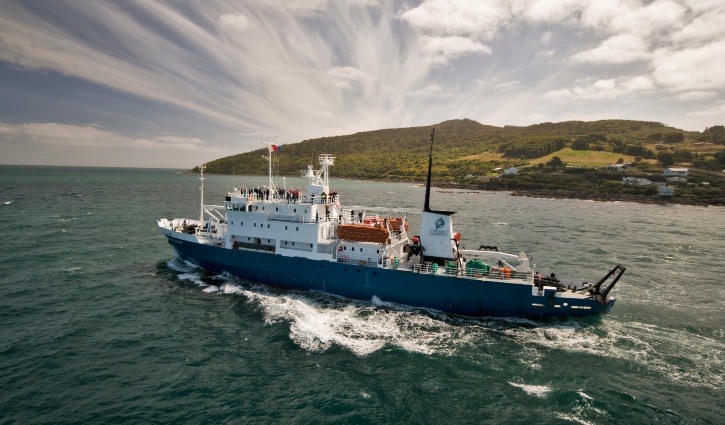
Image Courtesy of Heritage Expeditions.
This evening there will be an informal get together at the hotel for dinner, an excellent opportunity to meet fellow adventurers and some of the expedition team. The following morning visit the Southland Museum to view the special Subantarctic display before transferring to the Port of Bluff where you will embark on the Spirit of Enderby for the Birding Down Under voyage.
DAY 3 THE SNARES – NORTH EAST ISLAND
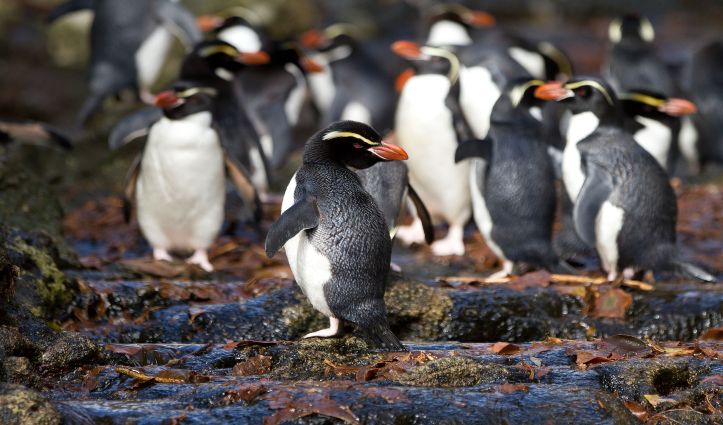
Cruise by Zodiac if weather and sea conditions are suitable along the sheltered eastern side of North East Island. You should see the endemic Snares Crested Penguin, Snares Island Tomtit and Fernbirds. Also you should see Cape Pigeons, Antarctic Terns, White-fronted Terns and Red-billed Gulls. There are hundreds of thousands of Sooty Shearwaters nesting here. Buller’s Albatross breed here from late December onwards.
DAYS 4-5 AUCKLAND ISLANDS
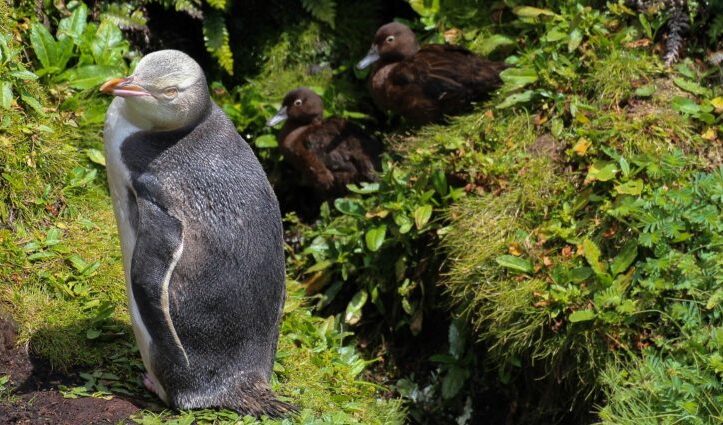
Image Courtesy of Heritage Expeditions taken by A Fergus.
Enderby Island:
Enderby Island is a great place to view birds and wildlife. Visit Sandy Bay, the main breeding ground for the rare New Zealand (Hooker’s) Sea Lion and just one of three breeding grounds on the Auckland Islands. There are chances to observe the Southern Royal Albatross, Northern Giant Petrel, Auckland Island Shag, Auckland Island Flightless Teal, Auckland Island Banded Dotterel, Auckland Island Tomtit, Bellbird, Pipit, Red-crowned Parakeet, Yellow-eyed Penguin and Light-mantled Sooty Albatross. Keep a lookout for the rare Subantarctic Snipe. On Derry Castle Reef there is a good chance of seeing the Bar-tailed Godwit, Turnstone and perhaps other migratory waders.

Carnley Harbour:
These islands have witnessed many a shipwreck in days gone by and harbour tales of castaways and coast watchers. If weather and sea conditions are suitable energetic expeditioners are able to climb to the South West Cape Shy Albatross colony where Gibson’s Wandering Albatross nest among the tussocks above the colony.
DAY 6 AT SEA
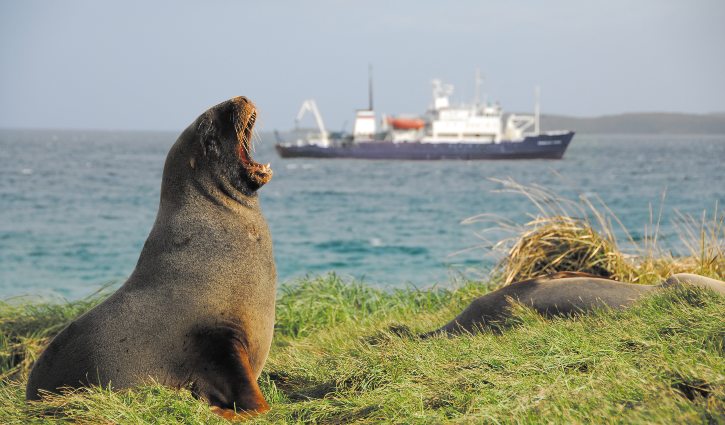
Image Courtesy of Heritage Expeditions taken by A Russ.
Expect some of the best pelagic birding on this leg of the journey from the Auckland Islands to Macquarie Island with great views of species such as the Royal Albatrosses, Wandering Albatrosses, Shy Albatross, Black-browed Albatross, White-chinned Petrel, diving-petrel, Little Shearwaters, storm-petrel and to confuse everybody, numerous prion species.
DAYS 7-8 MACQUARIE ISLAND
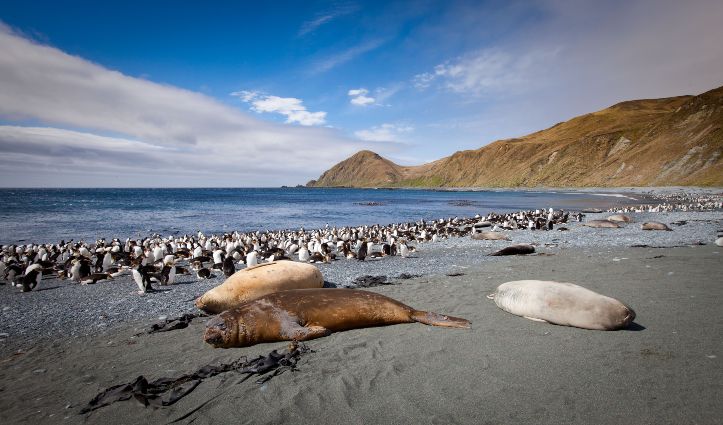
The only place in the world where the beautiful Royal Penguin breeds, this remote outpost supports a breath-taking concentration of wildlife. You will never forget your first experience of a noisy ‘penguin city’ where you will be witness to a thousand chattering, feeding chicks; territorial disputes; petty pilfering and courtship displays: King, Gentoo and Rockhopper Penguins can also be seen here. Meet with Park Rangers and seek out the thousands of Southern Elephant Seals lolling on the beaches and along the coast, Redpolls and Imperial Shag can often be spotted.
DAY 9 AT SEA
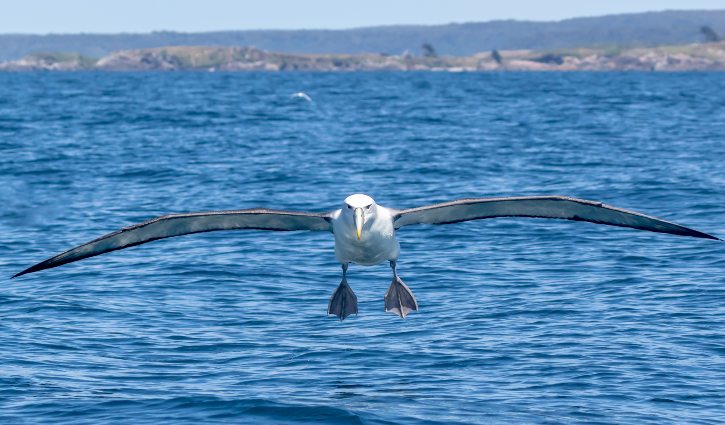
Keep a keen lookout for cetaceans, albatross and petrels today, relax in the ship’s bar or catch up on your reading in the library.
DAY 10 CAMPBELL ISLAND
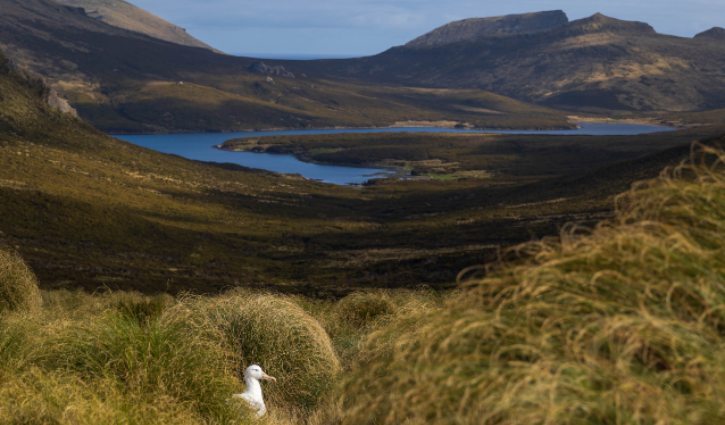
Drop anchor in Perseverance Harbour. Once on shore walk to the nesting site of the Southern Royal Albatross or to Northwest Bay, passing beautiful megaherbs growing on the hills. During the day ashore you should see the Campbell Island Shag, Southern Skua, Antarctic Tern, Dunnock, New Zealand Pipit, Campbell Island Teal and hopefully the elusive Campbell Island Snipe.
DAY 11 AT SEA
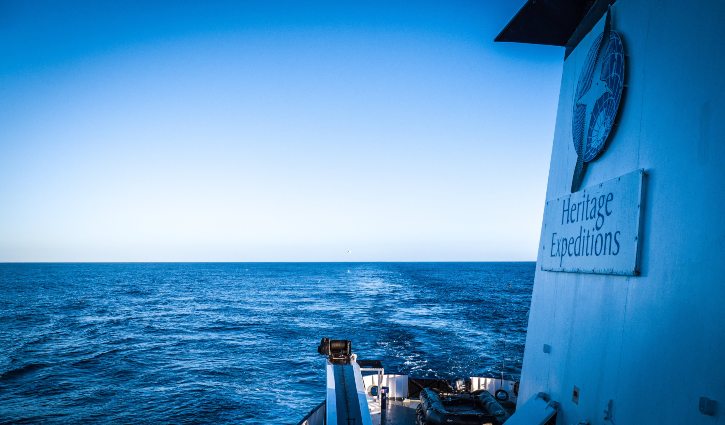
Image Courtesy of Heritage Expeditions taken by T Kraakman.
Jump on the bridge, where you can keep a keen lookout for species commonly seen in this area: Black-browed Albatross, Campbell Island Albatross, Light-mantled Sooty Albatross, Salvin’s Albatross, Sooty Shearwater and Little Shearwater. There should be plenty of petrels and again the hard to identify prion species.
DAY 12 ANTIPODES ISLAND
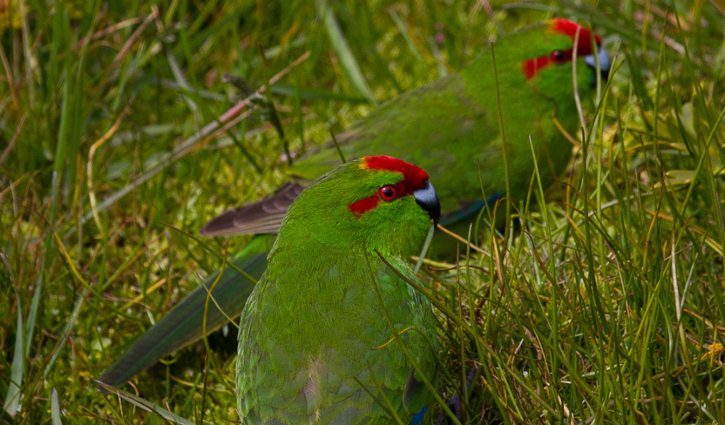
Image Courtesy of Heritage Expeditions taken by K Ovsyanikova.
One of the most isolated, least known and rugged of the Subantarctic Islands; landings here are not permitted, so you will cruise along the coast looking for the endemic Antipodes Island and Reischek’s Parakeet. You may also see the Antipodes subspecies of the New Zealand Pipit, and with half the world population of Erect-crested Penguins here, you should encounter one or two as well as Antarctic Terns and Kelp Gulls.
DAY 13 BOUNTY ISLANDS
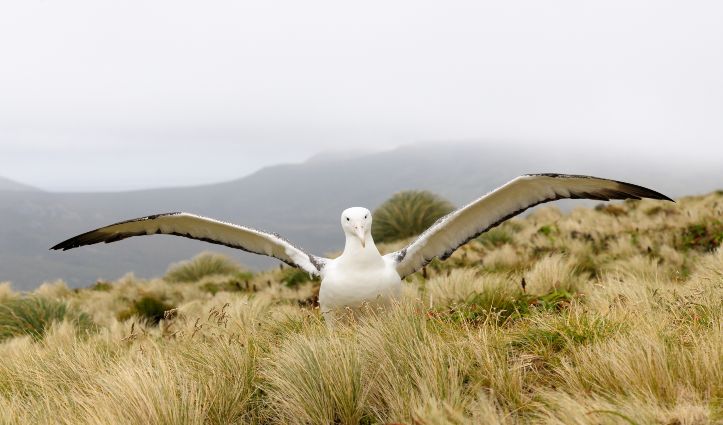
These inhospitable granite islets are home to thousands of Salvin’s Albatross, Erect-crested Penguins, Fulmar Prions and the endemic Bounty Island Shag, the world’s rarest. At sea you should spot Wandering Albatross species, Northern Royal Albatross, Mottled Petrel, Soft-plumaged Petrel, Broad-billed Prion, White-chinned Petrel and Black-bellied Storm-Petrels as well as Wilson’s Storm-Petrel.
DAY 14 AT SEA AND PYRAMID ROCK
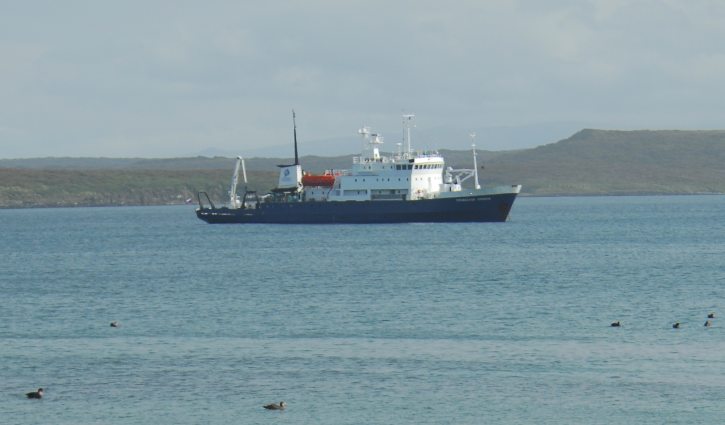
Image Courtesy of Heritage Expeditions taken by A Russ.
Continue north towards the Chatham Islands, with similar species accompanying you as yesterday. Towards evening as you approach the islands you are closer to the Subantarctic and sub tropical convergence and you will see a subtle change in the species composition. Late this afternoon arrive at the spectacular Pyramid Rock, the only breeding place of the Chatham Island Albatross.
DAY 15 CHATHAM ISLANDS – WAITANGI
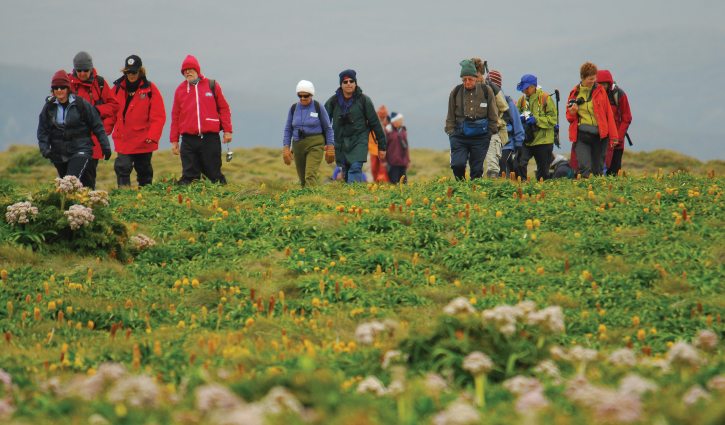
This morning go ashore on the main island where you might see the endemic Chatham Island Shag and along the coast the Chatham Island Oystercatcher. Visit a private bush reserve on the south coast to see the Chatham Island Warbler, Chatham Island Pigeon and Tui. This afternoon have another look for the Magenta and Chatham Island Petrels.
DAY 16 SOUTH EAST ISLAND AND MANGERE ISLANDS
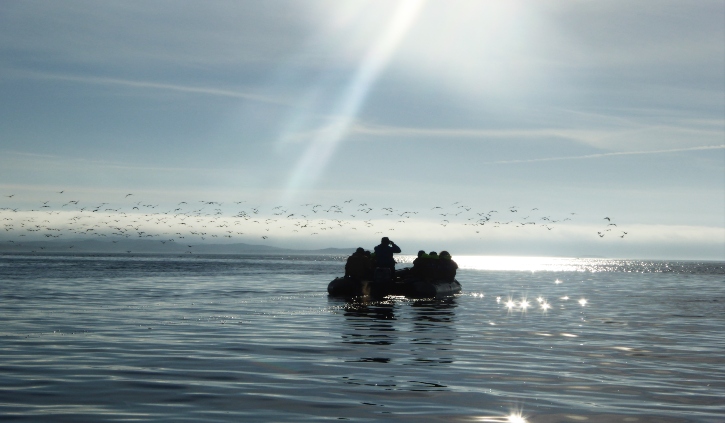
Arrive in the early morning at South East Island, one of the world’s greatest nature reserves. Here the plan is to Zodiac cruise to see the endangered Shore Plover. Also keep your eyes peeled for the Pitt Island Shag. Before you depart the archipelago visit the Mangere Islands from where the endemic Black Robin was rescued.
DAYS 17-18 AT SEA
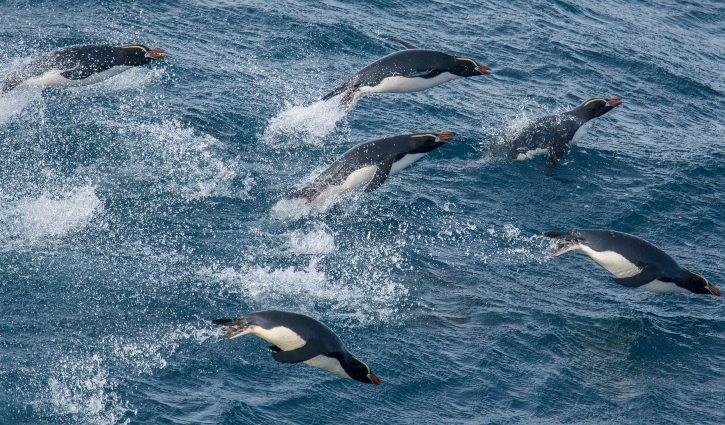
Image Courtesy of Heritage Expeditions taken by Lisle Gwynn.
En route to Dunedin you will cross the Chatham Rise, here nutrient-rich waters allow for an overlap between northern pelagic species and birds from southern latitudes. Expect to see Royal Albatross, Wandering Albatross, Westland Black Petrel, Cook’s Petrel and much more.
DAY 19 DUNEDIN, NEW ZEALAND

En route to Dunedin you will cross the Chatham Rise, here nutrient-rich waters allow for an overlap between northern pelagic species and birds from southern latitudes. Expect to see Royal Albatross, Wandering Albatross, Westland Black Petrel, Cook’s Petrel and much more.


